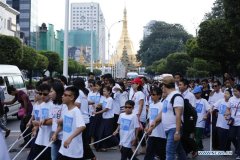Xinhua Insight: Hush! Exhausted moms turn to baby sleep consultants
WUHAN, March 21 (Xinhua) -- Late at night, the baby is screaming again. The exhausted mother gets up, rocks, feeds and sings him to sleep and sneaks away. But she knows the "bomb" will explode at some point soon.
Liu Dan is very familiar with this scenario. The new mom has only slept three or four hours every night since her son was born. During the day, she works at a broadcasting station in Hangzhou City.
A well-known supplement in China advertises that it can help people "sleep like a baby," but Liu scoffs at the tagline.
"I'm sure the designer is not a parent," said Liu. "The words should be changed to 'sleep like a baby's father.'"
"Getting a child to sleep can be one of the most difficult tasks of parenting. I'm on the brink of collapse," the sleep-deprived mother complained.
Liu's sleep struggles are shared by many frustrated moms. An industry white paper on Chinese infant sleep released in December showed that more than 75 percent of parents complain about frequent night waking by their babies, especially those aged six months to one year.
Why are they not sleeping well? It could be hunger, teething, noise or illness. But only 6 percent of parents know the reason for their babies' nocturnal fussing, the paper said.
Older generations in China traditionally attributed infant sleep trouble to a calcium deficiency or considered it part of normal infant behavior.
Frustrated and exhausted, Liu turned to a baby sleep consultant for an answer. After paying 298 yuan (around 43 U.S. dollars) for an online lecture, she got her baby to sleep throughout the night for the first time after two weeks.
HUSH LITTLE BABY
The online lecture was provided by Chen Yuwen, former GE project manager and now a baby sleep consultant.
As the first baby sleep consultant certified by the International Maternity and Parenting Institute (IMPI) in the Chinese mainland, Chen has dealt with tens of thousands of sleep-deprived moms at their wits' end.
In the last month alone, Chen has sold nearly 1,400 online lectures to Chinese parents struggling to get their little ones to bed. Through the lectures, she teaches parents how to improve a baby's sleep environment, tips for soothing little ones, and other useful tricks.
Baby sleep consulting is a growing field in China.
One consultant training agency plans to offer a 30-member class in Shanghai to would-be baby whisperers. The week-long training course costs 19,800 yuan per person, but applicants have already outnumbered openings.
"Applicants come from various professions, including housewives, designers, flight attendants, nurses and editors. All of them see big profits in this career," said Wang Shiyunyue, the agency's head.
Wang said clients' favorite product is a 21-day sleep training package that includes consultations, home visits, 24-hour support and a sleep plan that is completely customized for babies. It costs around 5,000 yuan.
Even cheaper packages involving a 15-minute phone consultation, 90-minute home visits and follow-up support cost 799 yuan.
The emergence of baby sleep consultants can be explained by the pressure professional couples feel and the potential market for maternal and infant-related services in China.
According to a document released by the National Health and Family Planning Commission, 18.46 million babies were born in Chinese hospitals last year, the highest since 2000 and 1.31 million more than 2015.
Chen decided to go full-time as a consultant in 2013 when the country allowed couples to have a second child if either parent was an only child.
Failing to stop her own baby's frequent night waking, she read books and posted about her own experience and what she learned online.
"I received thousands of questions and was surprised that so many moms have been troubled by the same problem," said Chen.
DIVIDED OPINION
"Many parents are willing to pay for milk powder and baby diapers, but refuse to pay for knowledge. I'm ready for challenges in being a sleep consultant," said Lin Xiaonuan, a former journalist.
Earlier in her consultant career, she answered the phone and heard the woman at the other end in tears, and she recalled crying herself.
"I don't want to experience that frustration again. I feel good helping these moms fix their problems," said Lin.
Zhang Silai, a pediatrician, agreed that fixing the problem is very important. Hormonal changes after birth, plus sleep deprivation, can increase postpartum depression in new mothers.
However, critics say that it is cruel and risky to train babies to sleep.
One mom said most of these sleep-training techniques are just variations of the old "cry-it-out" method.
"My heart would break (to let the baby cry). It runs the risk of the baby losing trust. I'd rather not sleep," she added.
Others question the lack of clarity around qualifications and registration for consultants, as the industry is not regulated.
As more organizations target this profitable market and churn out consultants promising parents a full night's sleep, Chen also worried that the reputation of the field will be affected.
"Sleep guidance is different from sleep training, It is not a cry-it-out method. We need to understand the baby's needs, observe signs of sleep and help establish regular daily routines and good sleeping habits," said Chen.















